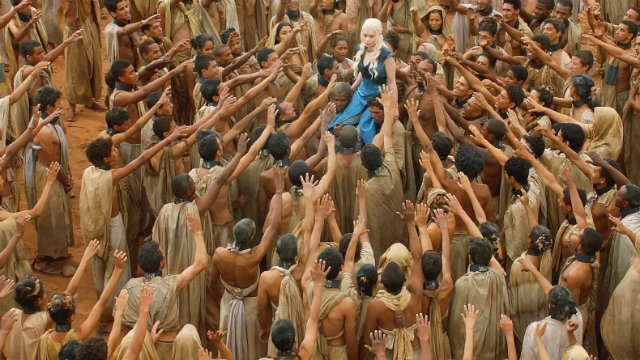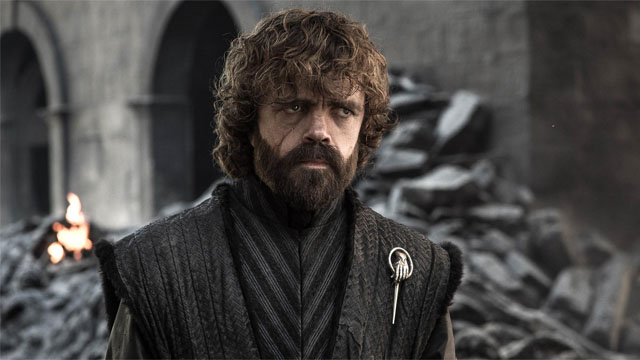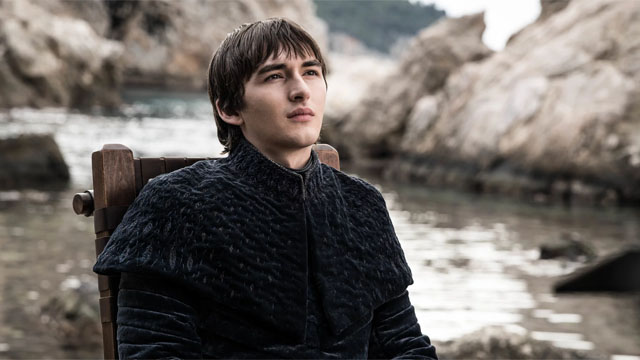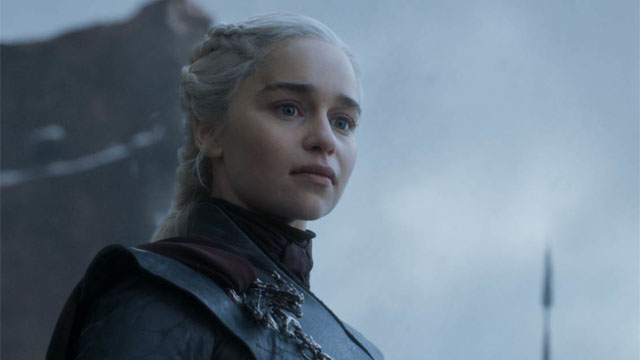Warning: There are massive spoilers ahead for the Game of Thrones finale!
Game of Thrones gave us many deliberately queasy moments over its eight seasons, from incest to rape and the murder of a pregnant woman, More recently, the charred bodies and ashes of King’s Landing felt deliberately designed to evoke Hiroshima, as a weapon of mass destruction decisively ended the war with a stunning human cost. But on at least one occasion, the show delivered a queasy moment that, at the time, felt unintentional.
When Daenerys Targaryen freed the slaves of Yunkai, the episode ended with the image of a crowd of dark-skinned people lifting their pale liberator aloft as the ultimate white savior. Even in a country where the Best Picture Oscar went to a movie like Green Book, this played badly. The show’s heroine was all of a sudden becoming a terrible, outdated plot device. While so many of the events of Game of Thrones have been “less than woke,” it’s usually the plot details that were rabidly un-PC. That scene suggested that the creators were clueless as well.
Delusions of Grandeur

Now we know differently. The scene wasn’t telling us that we should believe Daenerys was a white savior; it was showing us that she believed she was. In the end, that was exposed as her fatal flaw. Rather than simply admit her lust for power, Daenerys couched in the language of liberating others for their own good. Like Anakin Skywalker in Attack of the Clones, she wanted a dictatorship as long as she was the one dictating. And just as The Phantom Menace looks a lot better once you realize Jar Jar’s crazy luck got him promoted to a place he had no business being, where he could cast galaxy-killing votes…Daenerys’ previous actions are now layered in thick, dark irony.
RELATED: Game of Thrones Series Finale – What Did You Think?!
Was her split-second decision to roast a surrendered city a bit rushed? Yes, but so was everything else this season. Regardless, the choice was also foreshadowed as a Harry S. Truman/atomic bomb decision, that weighed the notion of killing innocents now versus later. The apocalyptic imagery in its wake only reinforced the metaphor. But what if Truman, post WWII, had decided to use more nuclear bombs to conquer the world? That’s the kind of scenario that can be explored in fantasy. Rather than becoming a tediously predictable epic hero who reclaims his heritage and the throne, Jon Snow became a real life hero. He knew the penalty for treason, and committed it anyway. For Jon, doing right had to be its own reward, as he lost everything else.
A Scheme of Spring

Given the way Game of Thrones usually plays things, we might have expected to see Tyrion or Arya perish, since they had served their purpose in the story. But in a weird way, Tyrion’s survival is the moral core of the show. Every other character who schemed and played people against each other for personal gain bit the dust at some point, from Littlefinger to Varys. Tyrion finally started to scheme for selfless rather than selfish reasons, and that saved him. As for Arya, she seems like a dangling thread (with her own needle, natch) on which to tie future adventures.
Sansa’s story is less satisfying. After all she’s been through, it’s Jon and Tyrion’s perception of what she might do under Daenerys that turns out to be more significant than anything Sansa actually does. It’s nice that she gets a kingdom, but even Bronn got a castle, and he deserves it far less. Regardless, killing Sansa off would have been insulting and casually misogynist. So fine. She’s queen of her own thing now.
Crown the Raven, Evermore

Now we have Bran as the new king, which is one of the show’s mightier upendings of fantasy tropes. Merlin isn’t supposed to wield Excalibur. The wizard is never meant to be the ruler. But why not? He’s generally the smartest person in any given room. Although classical structure usually kills the wizard off so the hero can face a final trial alone. The Night King knew Bran was the right man for the job, and thus tried to kill him at all costs.
But it also adds a perfect symmetry between the first episode and the last. A show that began with Jaime Lannister pushing Bran out a window to cover up his intimate affair with Cersei ends with Jaime and Cersei united in death while the “boy who lived” takes their place in the chain. From Moses to Harry Potter, almost any story that begins with the villains trying to murder a child ends with the child being key to their downfall.
And kudos to David Benioff and Dan Weiss for faking me out in the best possible way. For a split-second there, I genuinely believed Westeros might embrace democracy. As the late Grumpy Cat might say, it was horrible.
What do you think about the Game of Thrones finale? Were you satisfied by its resolutions? Let us know in the comment section below!





